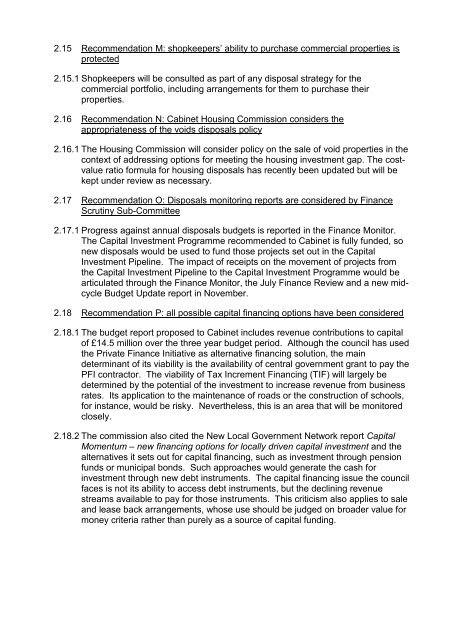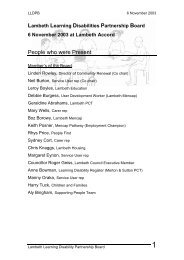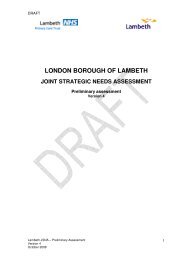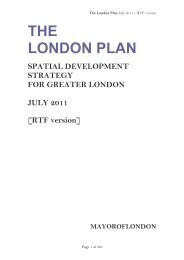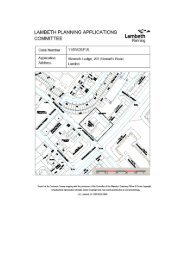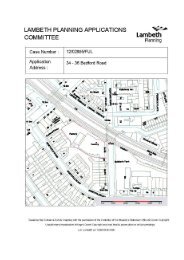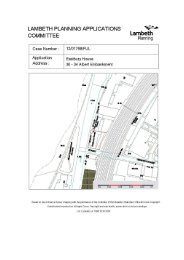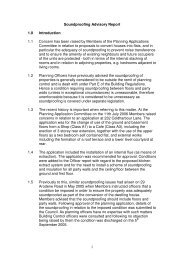Asset Disposal Strategy Scrutiny Commission ... - Lambeth Council
Asset Disposal Strategy Scrutiny Commission ... - Lambeth Council
Asset Disposal Strategy Scrutiny Commission ... - Lambeth Council
Create successful ePaper yourself
Turn your PDF publications into a flip-book with our unique Google optimized e-Paper software.
2.15 Recommendation M: shopkeepers’ ability to purchase commercial properties is<br />
protected<br />
2.15.1 Shopkeepers will be consulted as part of any disposal strategy for the<br />
commercial portfolio, including arrangements for them to purchase their<br />
properties.<br />
2.16 Recommendation N: Cabinet Housing <strong>Commission</strong> considers the<br />
appropriateness of the voids disposals policy<br />
2.16.1 The Housing <strong>Commission</strong> will consider policy on the sale of void properties in the<br />
context of addressing options for meeting the housing investment gap. The costvalue<br />
ratio formula for housing disposals has recently been updated but will be<br />
kept under review as necessary.<br />
2.17 Recommendation O: <strong>Disposal</strong>s monitoring reports are considered by Finance<br />
<strong>Scrutiny</strong> Sub-Committee<br />
2.17.1 Progress against annual disposals budgets is reported in the Finance Monitor.<br />
The Capital Investment Programme recommended to Cabinet is fully funded, so<br />
new disposals would be used to fund those projects set out in the Capital<br />
Investment Pipeline. The impact of receipts on the movement of projects from<br />
the Capital Investment Pipeline to the Capital Investment Programme would be<br />
articulated through the Finance Monitor, the July Finance Review and a new midcycle<br />
Budget Update report in November.<br />
2.18 Recommendation P: all possible capital financing options have been considered<br />
2.18.1 The budget report proposed to Cabinet includes revenue contributions to capital<br />
of £14.5 million over the three year budget period. Although the council has used<br />
the Private Finance Initiative as alternative financing solution, the main<br />
determinant of its viability is the availability of central government grant to pay the<br />
PFI contractor. The viability of Tax Increment Financing (TIF) will largely be<br />
determined by the potential of the investment to increase revenue from business<br />
rates. Its application to the maintenance of roads or the construction of schools,<br />
for instance, would be risky. Nevertheless, this is an area that will be monitored<br />
closely.<br />
2.18.2 The commission also cited the New Local Government Network report Capital<br />
Momentum – new financing options for locally driven capital investment and the<br />
alternatives it sets out for capital financing, such as investment through pension<br />
funds or municipal bonds. Such approaches would generate the cash for<br />
investment through new debt instruments. The capital financing issue the council<br />
faces is not its ability to access debt instruments, but the declining revenue<br />
streams available to pay for those instruments. This criticism also applies to sale<br />
and lease back arrangements, whose use should be judged on broader value for<br />
money criteria rather than purely as a source of capital funding.


